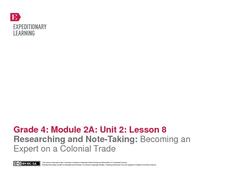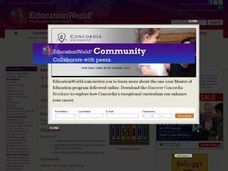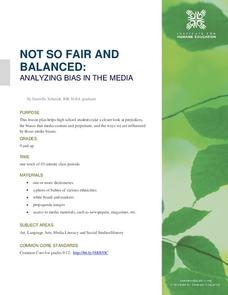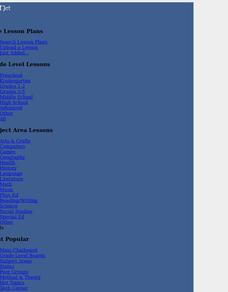Florida Center for Reading Research
Dictionary Cube
Young scholars investigate new vocabulary words with a fun, collaborative activity. Given a deck of word cards, pairs of students flip over one at a time and independently look up the term in a dictionary. They then take turns rolling a...
Curated OER
Creating a Picture Dictionary
Second graders create a reading, vocabulary,picture dictionary on the computer. They participate in becoming familiar with some basic capabilities of a word processor. They build vocabulary, spelling, and dictionary skills, reinforce...
Curated OER
Guide Word Game
In pairs, learners describe and use guide words to locate words in a dictionary. This is a timed activity, where points can be earned by completing the goal first. Tip: Have kids look up weird words in the dictionary, and then come up...
Curated OER
What is a Dictionary?
Second graders explore the purpose of a dictionary. For this library media lesson, 2nd graders explore My First Dictionary and identify guidewords, entry words, and captions. Students list ways they can use the dictionary.
John Wiley & Sons
Defining Leadership
Learners use their experience with leadership, as well as a thought-provoking quote and discussion with their classmates, to help them define the concept of leadership.
EngageNY
Researching and Note-Taking: Becoming an Expert on a Colonial Trade
Fourth graders work in small groups to become experts on different colonial trades in the eighth instructional activity of this unit. Working toward the long-term goal of writing a piece of historical fiction, young scholars read...
Southern Poverty Law Center
Evaluating Online Sources
All sources are pretty much the same, right? If this is how your class views the sources they use for writing or research projects, present them with a media literacy lesson on smart source evaluation. Groups examine several articles,...
Curated OER
Using Context
Teams practice decoding and using context strategies to determine the meanings of unfamiliar words. After verifying the meanings of words through the use of dictionaries, the Internet, thesauruses, and other sources, learners write the...
Curated OER
Use the New Internet Library for Adult Learners
Adult learners, examine the Internet to answer life skills, use an online dictionary, evaluate web sites and fill in online forms. They will also write about web sites in this series of activities.
Curated OER
100 Questions
Gather around to play a game! Middle and high schoolers answer questions (provided here) using various reference materials. Bring encyclopedias and other reference materials to class, as each group has limited Internet access! An answer...
Curated OER
Totally Trivial - "A"
High school students can hone their research skills by utilizing the Internet to find the answers to the trivia questions presented in this on-line worksheet. All sorts of questions are posed: everything from questions about famous...
Curated OER
Alphabetize For A Reason
Students organize information by using the alphabet. Students organize materials alphabetically. Students alphabetize with the first, second and third letters of a set of words. Students discover applications for alphabetical order.
Institute for Humane Education
Not So Fair and Balanced: Analyzing Bias in the Media
Life is not always fair. Who's heard that before? This same concept moves to a larger scale using prejudice and bias. Pupils discuss where prejudice attitudes derive and how they develop throughout life. Reading comprehension...
Curated OER
Online Words
Young scholars define spelling/vocabulary words using an online dictionary. In this Internet resources lesson, students learn how to use an online dictionary to look up the definitions of their spelling or vocabulary words.
Lake Middle School
Cornell Notetaking
The beauty of this colorful presentation about Cornell notes is that it begins with a very powerful statistic: "Those who take organized notes and do something with them remember 90-100% of the material indefinitely!" Zounds! Now there's...
Pala Software
SpellBoard
How do you spell great? G-R-E-A-T! Ensure that your pupils can spell great and so much more with this effective app.
Curated OER
Jan Brett Encyclopedia Lesson
Third graders develop encyclopedia skills to locate information. In this Jan Brett library lesson, 3rd graders research animals in the encyclopedia and complete a worksheet on one animal. Students relate their work to the work of Jan...
Curated OER
Learning New Words
Learners, working in groups, make as many words as possible in a given time, using flash cards that contain prefixes, words, and definitions. They chose group roles and participate in a numbers of time rounds of this activities.
Curated OER
Basic Knowledge of Big Cats
First graders create a KWL chart on big cats. In this animal science lesson plan, 1st graders brainstorm what they already know about big cats and research big cats using various suggested websites. Students fill in the last column of...
Teachers.net
Smoking and the Advertising Industry (Middle, other) SMOK_AD.DOC
Students study advertising techniques and the effects of smoking on health.
Curated OER
How To Use the Internet To Make Student Glossaries
Young scholars use an internet dictionary to produce a glossary of words related to a particular subject area being studied. They choose the correct meaning of the word for their glossary, based on it's relationship to the subject matter...
Media Smarts
Defining Popular Culture
What part does media play in creating, defining, and perpetuating popular culture? High schoolers chart their encounters with fads, trends, and icons and reflect on the media's influence on popular culture.
Curated OER
The History of Mathematics
Research the interrelationship between math and science. Search the Internet to discover the history of several branches of mathematics and make text-to-world connections between the concepts covered in each branch with related...
Curated OER
Branding Circles, Squares, Rectangles, Triangles
Compare and classify 2-D shapes! Kindergarteners inspect the attributes of plane shapes and examine shapes in everyday life. They label the circles, squares, rectangles, and triangles they find. This is the website where you can find the...























